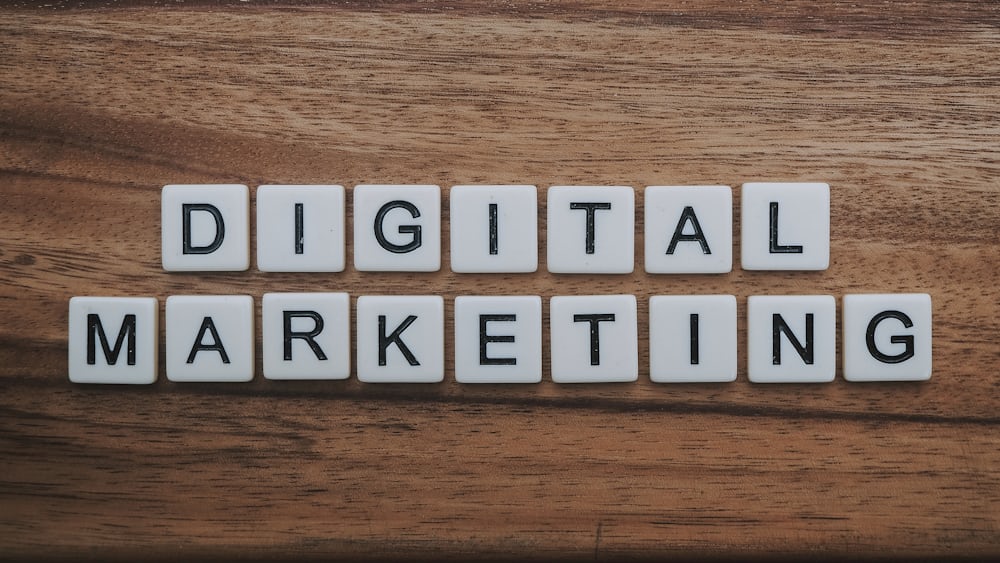Digital marketing is “the promotion and marketing of goods and services to consumers through digital channels and electronic technologies.” It involves the use of digital technologies like the internet, mobile devices, social media, and search engines.

In this process, tactics like “creating an omnichannel presence, developing trust with consumers, using marketing automation tools, and personalized marketing content” are utilized.
By using a digital marketing strategy, organizations can “support larger marketing campaigns to improve brand awareness and recognition, generate leads, increase website traffic,” and ultimately “boost sales and business growth.”
What is Digital Marketing?

Digital marketing refers to the use of digital channels, such as search engines, social media, email, and websites, to promote products or services. Unlike traditional marketing, which relies on offline channels (TV, radio, print), digital marketing allows businesses to target specific audiences and measure campaign performance in real time.
Key Components of Digital Marketing
Search Engine Optimization (SEO):
Content Marketing:

Content marketing focuses on creating valuable, relevant content that attracts and engages a target audience. This can include blog posts, infographics, videos, eBooks, and podcasts. Quality content helps establish your brand as an authority in your industry, leading to increased trust and potential conversions.
- Social Media Marketing
Social media platforms like Facebook, Instagram, Twitter, and LinkedIn allow businesses to engage directly with their audience. Through consistent posts, targeted ads, and influencer collaborations, social media marketing helps boost brand visibility, customer engagement, and lead generation. - Email Marketing:
Email marketing remains one of the most effective ways to communicate with customers. Through personalized emails, businesses can nurture leads, share valuable content, and promote products or services. Email marketing is cost-effective and offers high returns on investment (ROI) when done correctly. - Pay-Per-Click (PPC) Advertising:
PPC is a form of paid advertising where advertisers pay each time a user clicks on their ad. Google Ads is the most popular PPC platform, but you can also run PPC campaigns on social media platforms. These ads are displayed based on specific keywords or audience interests, allowing for highly targeted campaigns. - Affiliate Marketing:
Affiliate marketing involves partnering with individuals or other companies (affiliates) to promote your product or service. Affiliates earn a commission for each sale or lead they generate. This strategy allows businesses to expand their reach without handling the marketing themselves. - Influencer Marketing:
Influencer marketing leverages the audience of prominent individuals (influencers) to promote a product or service. Influencers, especially in niches like beauty, tech, or fitness, can sway the opinions of their followers, making them effective at promoting products authentically.- Effectiveness: Email marketing is one of the most reliable methods for customer communication, maintaining strong engagement rates.
- Personalization: Tailored emails help nurture leads, making recipients feel valued and improving conversion rates.
- Content Sharing: It’s an effective way to distribute valuable content, keeping customers informed and engaged.
- Cost-Effectiveness: Email marketing is typically low-cost compared to other marketing channels, providing a high return on investment (ROI) when executed properly.
- Promotional Opportunities: It serves as a direct channel for promoting products and services, driving sales and customer loyalty.
- Definition and Platforms: Social media marketing involves using platforms like Facebook, X (formerly Twitter), and Instagram to promote products, engage with customers, and attract new audiences.
- Core Benefits: It excels in three main areas:
- Connection: Builds relationships between brands and consumers.
- Interaction: Facilitates two-way communication, enhancing customer engagement.
- Customer Data: Provides valuable insights for tailoring messages and strategies.
- Consumer Behavior Influence: Social media has changed how businesses affect consumer choices, from engaging content to personalized messaging based on user data.
- Ubiquity and Importance: Given its widespread use, effective social media marketing is crucial for modern businesses.
- Cost-Effectiveness: Often more affordable than traditional marketing, social media can offer significant visibility. However, it requires consistent effort and may lead to negative feedback if not managed carefully.
SEO is the process of optimizing your website to rank higher on search engine result pages (SERPs). The goal is to increase organic traffic from users searching for relevant keywords. This involves keyword research, on-page optimization, link building, and improving the overall user experience on the website.
Why is Digital Marketing Important?
- Wider Audience Reach:
With billions of people online, digital marketing helps you reach customers globally, beyond geographical boundaries. - Cost-Effective:
Compared to traditional advertising methods, digital marketing is much more affordable, allowing businesses of all sizes to market effectively. - Targeted Campaigns:
Digital platforms offer advanced targeting options, allowing businesses to show their ads to the right people based on demographics, interests, and online behavior. - Real-Time Analytics:
Digital marketing platforms provide analytics tools to track the success of campaigns. You can measure metrics like traffic, conversion rates, and ROI, and make data-driven decisions to improve future campaigns. - Engagement and Relationship Building:
Through social media and email marketing, businesses can foster better relationships with their audience, leading to higher customer loyalty and retention.
Getting Started with Digital Marketing
If you’re new to digital marketing, here’s how you can get started:
- Define Your Goals:
Determine what you want to achieve through digital marketing. Are you looking to increase brand awareness, drive traffic, or boost sales? Having clear goals will shape your strategy. - Know Your Audience:
Understanding your target audience is crucial for creating content and running campaigns that resonate with them. Research their demographics, online behavior, and preferences. - Create a Content Plan:
Whether it’s blog posts, videos, or social media content, having a content plan helps ensure that your message is consistent and aligns with your goals. - Choose the Right Channels:
Not every digital marketing channel will work for your business. Focus on the platforms that are most relevant to your audience and industry. - Monitor and Adapt:
Use analytics tools to track the performance of your campaigns. Be ready to tweak your strategy based on data and feedback to achieve the best results.
